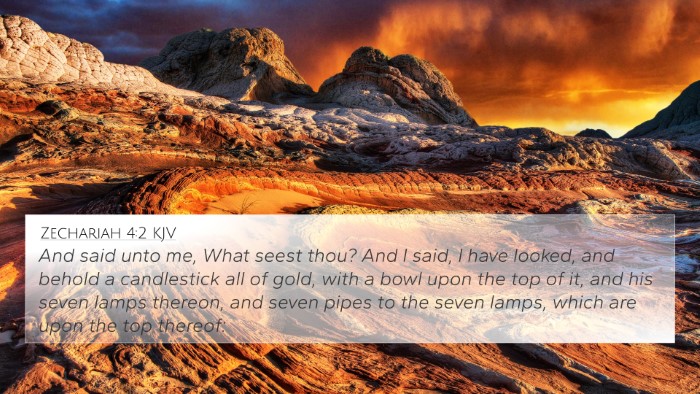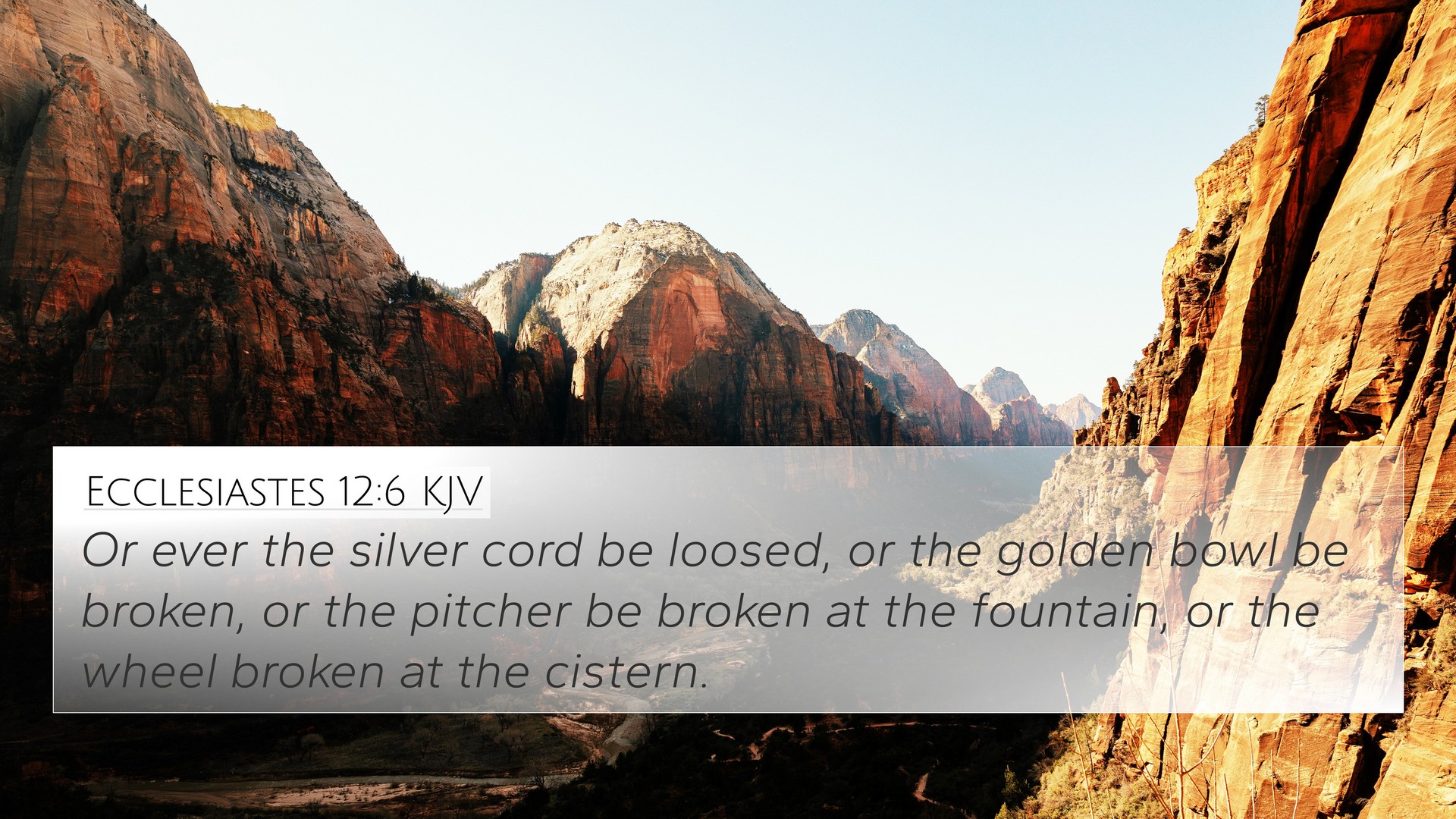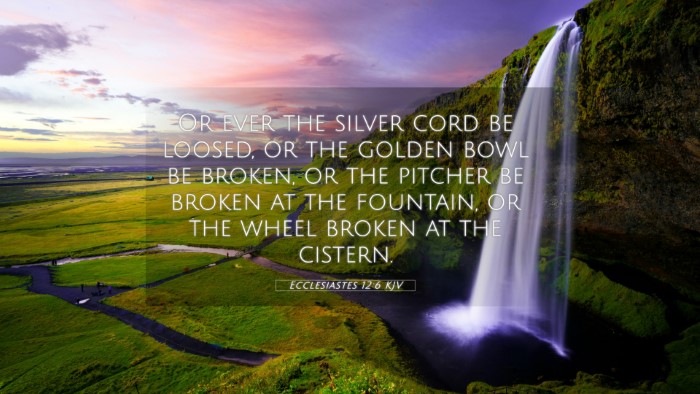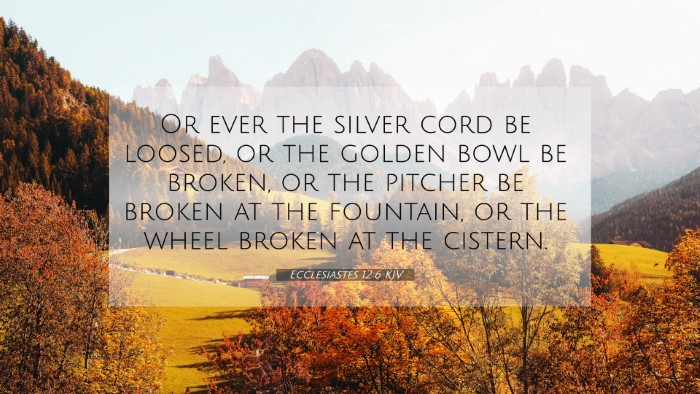Old Testament
Genesis Exodus Leviticus Numbers Deuteronomy Joshua Judges Ruth 1 Samuel 2 Samuel 1 Kings 2 Kings 1 Chronicles 2 Chronicles Ezra Nehemiah Esther Job Psalms Proverbs Ecclesiastes Song of Solomon Isaiah Jeremiah Lamentations Ezekiel Daniel Hosea Joel Amos Obadiah Jonah Micah Nahum Habakkuk Zephaniah Haggai Zechariah MalachiEcclesiastes 12:6 Similar Verses
Ecclesiastes 12:6 Cross References
Or ever the silver cord be loosed, or the golden bowl be broken, or the pitcher be broken at the fountain, or the wheel broken at the cistern.
Uncover the Rich Themes and Topics of This Bible Verse
Listed below are the Bible themes associated with Ecclesiastes 12:6. We invite you to explore each theme to gain deeper insights into the Scriptures.
Ecclesiastes 12:6 Cross Reference Verses
This section features a detailed cross-reference designed to enrich your understanding of the Scriptures. Below, you will find carefully selected verses that echo the themes and teachings related to Ecclesiastes 12:6 KJV. Click on any image to explore detailed analyses of related Bible verses and uncover deeper theological insights.

Zechariah 4:2 (KJV) »
And said unto me, What seest thou? And I said, I have looked, and behold a candlestick all of gold, with a bowl upon the top of it, and his seven lamps thereon, and seven pipes to the seven lamps, which are upon the top thereof:
Ecclesiastes 12:6 Verse Analysis and Similar Verses
Understanding Ecclesiastes 12:6
Ecclesiastes 12:6 states: "Before the silver cord is loosed, or the golden bowl be broken, or the pitcher be broken at the fountain, or the wheel broken at the cistern."
Overview of the Verse
In this poignant verse, the author of Ecclesiastes emphasizes the inevitability of death and the fragility of human life. The metaphors employed serve to illustrate how easily life can be disrupted, highlighting the transient nature of human existence.
Insight from Biblical Commentaries
Matthew Henry's Commentary
Matthew Henry interprets the imagery as a reflection on human mortality. The "silver cord" and "golden bowl" symbolize life and its delicate nature, while their breaking signifies death's arrival. He further elaborates that these symbols remind us to live wisely and prepare for the end of our earthly journey.
Albert Barnes' Commentary
Albert Barnes connects the metaphors to various parts of human life. The "silver cord" may represent the soul's connection to the body, and the "golden bowl" suggests the noble nature of life itself. As these elements break or fail, it conveys the idea that we must cherish our days and recognize the divine purpose beyond our temporal existence.
Adam Clarke's Commentary
Adam Clarke presents the breaking of these objects as an inevitable decaying process. He notes that they signify our physical and spiritual decline over time. His interpretation underlines the importance of contemplation regarding mortality and living in a way that honors God, acknowledging that life should not be taken for granted.
Cross-References and Connections
Ecclesiastes 12:6 is intricately woven into biblical themes about life, death, and wisdom. The following verses serve as significant cross-references:
- Psalm 139:16 - "Your eyes saw my unformed substance; in your book were written, every one of them, the days that were formed for me, when as yet there was none of them."
- James 4:14 - "Yet you do not know what tomorrow will bring. What is your life? For you are a mist that appears for a little time and then vanishes."
- Hebrews 9:27 - "And just as it is appointed for man to die once, and after that comes judgment."
- Job 14:1-2 - "Man who is born of a woman is few of days and full of trouble. He comes out like a flower and withers; he flees like a shadow and continues not."
- Proverbs 27:1 - "Do not boast about tomorrow, for you do not know what a day may bring."
- 2 Corinthians 5:1 - "For we know that if the tent that is our earthly home is destroyed, we have a building from God, a house not made with hands, eternal in the heavens."
- Isaiah 40:6-7 - "A voice says, 'Cry!' And I said, 'What shall I cry?' All flesh is grass, and all its beauty is like the flower of the field. The grass withers, the flower fades, when the breath of the LORD blows on it; surely the people are grass."
- Matthew 6:19-21 - "Do not lay up for yourselves treasures on earth, where moth and rust destroy and where thieves break in and steal, but lay up for yourselves treasures in heaven..."
Thematic Connections
Ecclesiastes 12:6 serves as a crucial thematic link in the Bible regarding the fleeting nature of life. Here are some significant themes and connections that can be examined:
- Mortality - The inevitability of death is a common thread that pervades scripture.
- Wisdom and Preparedness - Instructions on living wisely, recognizing our life’s transient nature, and preparing for eternity.
- Hope Beyond Death - While mortality is emphasized, the promise of eternal life in Christ provides a contrast to the despair of death.
Practical Applications
Reflecting on Ecclesiastes 12:6 prompts believers to:
- Live with purpose and intentionality, acknowledging that life is short and fleeting.
- Engage in deeper study and understanding of cross-references to gain fuller biblical context.
- Use available tools for Bible cross-referencing to uncover layered meanings and connections.
Conclusion
In conclusion, Ecclesiastes 12:6 serves as a sober reminder of our mortality and the importance of living wisely. The connections between this verse and others in the Bible enrich our understanding and underscore the need for a life lived in preparation for eternity. As we study these links, we enhance our appreciation of God's word and its thematic coherence throughout scripture.
Further Study
For those interested in deepening their understanding, consider exploring:
- How to use Bible cross-references effectively in personal study.
- Linking and comparing verses that address the themes of life, death, and eternal hope.
- Engaging in a comparative study of the teachings of Solomon with those of the New Testament.


